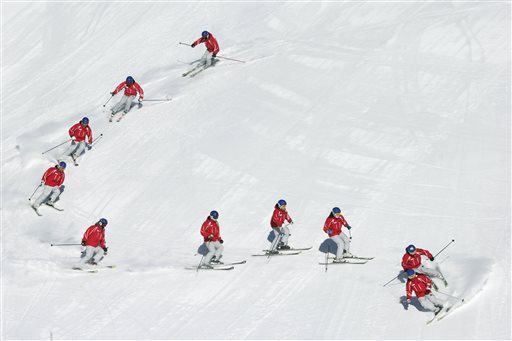Beijing touts experience, facilities in 2022 Olympic bid

In this photo taken Saturday, Dec. 6, 2014, ski instructors perform on the slopes of the Chongli ski resort in Hebei province where the Nordic skiing, ski jumping, and other outdoor Olympic events are proposed to be held for Beijing’s 2022 bid. Beijing has marketed its bid for the 2022 Winter Olympics as the reliable choice, despite concerns about a lack of natural snow, notoriously bad air pollution and warnings about the government’s treatment of political dissidents and minority groups. (AP Photo/Ng Han Guan)
BEIJING — Beijing has marketed its bid to host the 2022 Winter Olympics as the reliable choice, despite concerns about a lack of natural snow, notoriously bad air pollution and warnings about the government’s treatment of political dissidents and minority groups.
As the IOC prepares to choose between the Chinese capital and Almaty, Kazakhstan, Beijing backers hope that a wealth of venues and experience accumulated from the 2008 Summer Olympics will be enough to clinch the vote.
“We are convinced that there are multiple reasons why Beijing would be the ideal, athlete-centered, sustainable and economical choice,” Beijing mayor and bid committee chairman Wang Anshun said as he led a delegation to Kuala Lumpur, Malaysia, for final presentations and the vote on Friday.
If successful Beijing would be the first city to host both the Summer and Winter Olympics, yet another milestone for this city of 21 million from where the Chinese government has overseen a three decade-long economic boom that has lifted hundreds of millions out of poverty.
But while the Beijing bid had been the inside favorite, Almaty has emerged as a more robust contender than expected, boasting a strong winter sports tradition, plentiful natural snow and a compact design that places most venues less than an hour from the city center.
Beijing lacks high mountains in the immediate vicinity and its winters are known for being cold and dry, with only intermittent light snow. That requires situating the ski and sliding events at venues in Yangqing and Zhangjiakou, 60 and 140 kilometers (40 and 90 miles) outside the city, while indoor events will use venues in Beijing’s city center.
To compensate for the distance, a high-speed rail line is being built to Zhangjiakou that organizers say will cut the trip to 50 minutes, putting Beijing in easy reach of the Chongli ski area at the base of the Great Wall where the Nordic skiing events would be held. Organizers also say they have a plan to cut air pollution through a 75 percent reduction in coal use, factory closures and vehicle restrictions.
Beijing also promises a frugal plan, with a total budget of slightly over $3 billion, split roughly between organizing events and infrastructure construction, a fraction of the budget for the 2014 Winter Games at Sochi, Russia.
Six out of nine of the venues in the bid are already built, including the iconic “Bird’s Nest” stadium and “Water Cube” arena from Summer Olympics, helping to keep down costs.
Organizers are eager to emphasize their city’s proven ability to handle an Olympic-scale event, saying they’ve continued to hone their skill set since 2008.
“Since the Olympics, we’ve held more than 180 major events here,” Xiang Jun, executive deputy general manager of the Bird’s Nest, told The Associated Press. “We can handle anything.”
They’re also promoting the concept of expanding the appeal of winter sports to the 300 million people who live in China’s north. Already, skiing and ice hockey are attracting new fans from among the country’s burgeoning middle class.
“We’re already seeing these trends,” bid committee Deputy General Zhao Yinggang said. “The Olympics in Beijing would be a huge boost to their popularity.”
As with its 2008 bid, Beijing has come under intense criticism from human rights groups who say giving it the games will only reward the communist government for its strict limits on political organization and freedom of speech.
They’ve been given further ammunition by an ongoing campaign against human rights lawyers, dozens of whom have been detained in recent weeks. That’s seen as part of a drive by president and Communist Party head Xi Jinping — China’s most powerful leader in decades — to further shrink the space for political critics
The Internet also remains heavily regulated, with some social media sites blocked entirely. Organizers have pledged to lift those restrictions for the games.
Minority groups, especially Tibetans, Mongolians and Uighurs from the far northwestern region of Xinjiang, have also complained of tighter limits on political and religious life as well as being denied the right to travel abroad.
Despite commitments to loosen rules on foreign reporters in the country made during the 2008 games, Tibetan and Uighur areas remain largely off-limits to the media.
“Until the leaders of the Chinese Communist Party are prepared to reform and recognize the inherent rights of all people, they should not be awarded the honor of another Olympics,” four well-known advocates for democracy and minority rights wrote in a joint letter to the IOC last week.
The IOC, they warned, “must recognize that the Olympic spirit and the reputation of the Olympic Games will suffer further damage if the worsening human rights crisis in China is simply ignored.”
Such criticisms are blunted somewhat by Kazakhstan’s checkered reputation for authoritarian politics and civil rights abuses.














